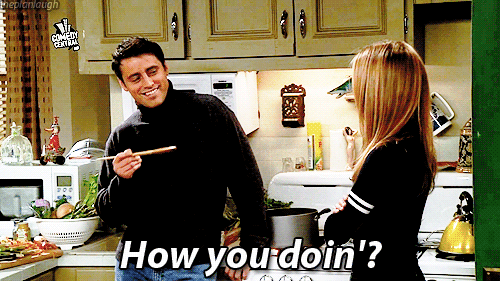Yesterday an acquaintance told me about a technique he had found for growing new relationships. When someone said to him, “Hello. How are you?” he answered honestly with information about how he was feeling or how his day was going.
Sirens sounded in my head. My inner magistrate, Judge Gavel Pounder, announced her stern verdict: I find you guilty of violating social norms and conventions.
For decades I have lived under Judge Gavel Pounder’s law. My thinking is, When people say, “Hello. How are you?” they are not asking for an organ recital. The lawful response is some version of, “Fine. And how are you?”
This morning, I wonder, Is that truly a law of language or is my inner judge wrong? I decide to investigate.
AI gives me a short answer that doesn’t satisfy me, so I dig through screen after screen of online articles, cutting and pasting relevant paragraphs and sentences. Printed, they fill nine pages. My brain turns to spaghetti.
I highlight and sort. Then I read again. Here’s what I discover.
People with cross-cultural experience maintain that a version of “Hello. How are you?” is also a common greeting in many languages and countries besides in US English. It’s common in French and in Spanish, in Turkey and Arabia. It is simply a greeting. Not an inquiry.
But in Russia speakers only ask “How are you?” if they really want to know. And in Germany, if you greet someone with “Hallo. Wie gehts?” (Hello. How are you?), you will encounter a pause and a puzzled face.
For English speakers, poet Ogden Nash agrees with Judge Gavel Pounder. A Nash rhyme says:
Do not tell your friend
About your indigestion.
“How are you?” is a greeting,
Not a question.
I am relieved that scholars and ESL experts agree with him. They identify it as a ritual or phatic speech, language that serves a social purpose of goodwill and acknowledgment but has no actual content. It is simply a way to signal, “I see you and I am friendly.” The greeter does not want to hear about your bunion or your dead battery. This lack of content is especially true for people we meet on the sidewalk or in crowded environments, and for clerks, cashiers, and strangers. Any variation of “fine” or “OK” will do. Responding with “fantastic” or “awesome” may lead to an expectation that you want to sell something. “I’ve been better” should probably be reserved for people you know.
Even for people you know, it is wise to wait until later in the conversation when you can get a sense of the other’s openness to your need to vent or tell a long tale of woe. Premature revelation may well create a perception you are an egoist, a whiner, or socially inept.
In online conversations among non-scholars, there is more difference of opinion. Some view “how are you” as insincere if the speaker isn’t truly seeking an answer. Witty people suggest wisecrack responses to those three words. Here is a sampling, but I wouldn’t recommend using them with strangers.
Those constant savage beatings are beginning to strengthen my resolve.
If I were having any more fun, I’d be throwing up in my shoes.
I was fine, until gangrene set in.
If I were any better, I’d be twins. One rich. One famous. And both good-looking.
Can't complain. Nobody listens anyway.
Like you, but better.
After wading through multiple opinions and articles, I think, My opinion has been confirmed. Both experts and the majority of non-experts agree with me. Then I look around. Where is Judge Gavel Pounder with her black robe and legal ruling? While I was flooded with ideas and opinions, she quietly floated out of my head. I reconsider those inner sirens. Perhaps my acquaintance had his reasons for making the choice he did. I know neither the context, nor the depth of the relationship, in which he chose to hear “How are you?’ as a genuine request for information.
I feel at peace. I have reached a conclusion. I have wrapped up a neat package of words and thoughts. But I am no longer judgmental.
Then I stumble across the GIF above this column. It’s a moment from Friends. I have heard of the TV show, but never watched an episode. According to the information accompanying the online GIF, Friends character Ross Geller is saying, “How’re you doin?’” But what he really means is, “Do you want to have sex with me?”
I give up. I think I’ll tie myself to this keyboard. For months. I don’t want to respond to “Hello. How are you?” until 2026.
Carol Van Klompenburg is a writer living in Pella, Iowa. She has a BA in English and an MA in Theater Arts — and is available for reading performances of her work.
Free sample chapters from her just-published book, A World in a Grain of Sand: Lively Little Stories of Household Stuff, are available simply by emailing Carol a request. She’d love to send them to you, no obligation: carolvk13@gmail.com. The complete book is available in Pella from her or from the Curiosity Shop. Or it can be ordered from Amazon.
Readers are calling it “stirring,” “winsome,” and “delightful.”





I sometimes leave a response which usually elicits, a quick look, sometimes a grin. "I'm still kickin!" Joyce is not sure she likes that one, so I have to use it a bit selectively. Being old has to have a few perks!
A friend who lives in Korea, sent me this information after reading this post:
A common Korean greeting is "Have you eaten?"
Apparently it comes from the time after the war when Korea was poor and people often missed meals.
The polite response is "Yes"